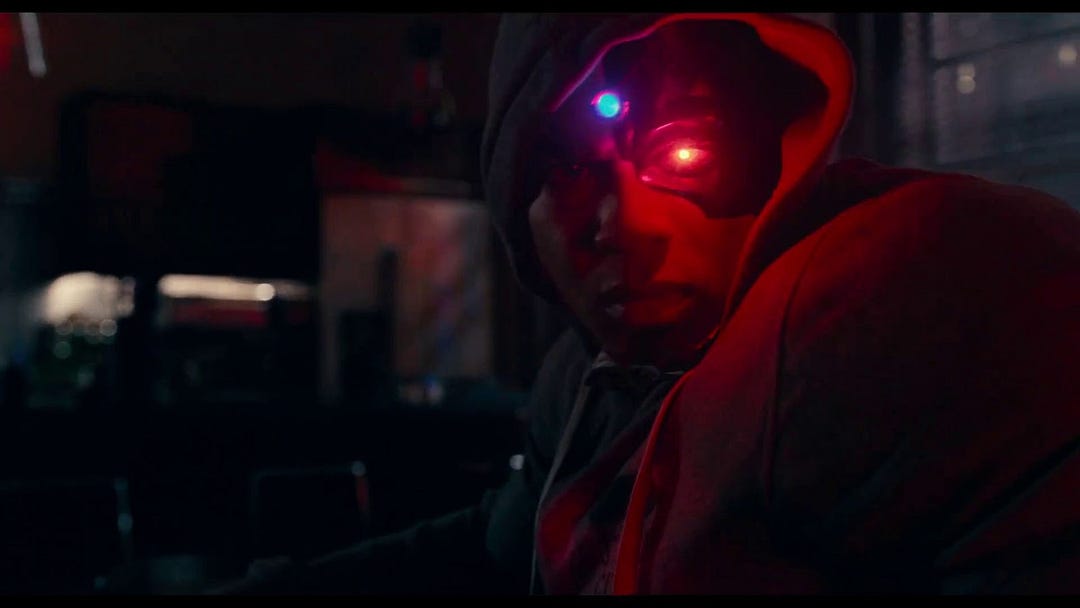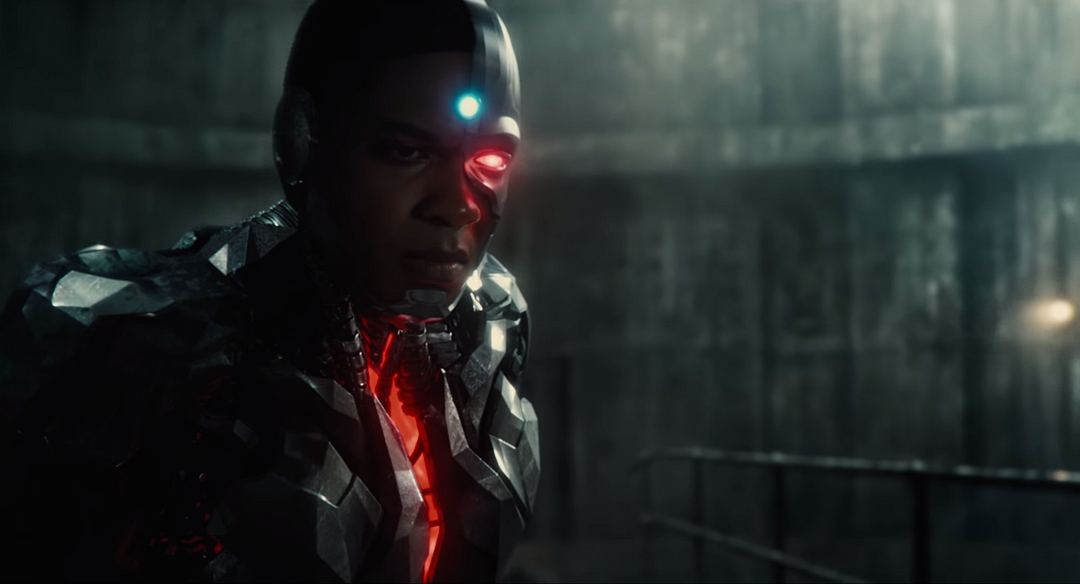This content has been archived. It may no longer be relevant
By: Lorenzo Simpson

The DCEU’s imagining of Cyborg is not the super cocky, super friendly hero that kids love from the Teen Titans TV shows, nor is he one of the countless black characters that fill the role of “badass black guy with a smart mouth.” Some early critics of the Justice League movie cited Cyborg’s presence as dull, but his story has a lot more going on than some think. No one bats an eye when Bruce Wayne (no pun intended) is dark and brooding, because we understand the major losses in his life that brought him to that point. Cyborg has lost a great deal as well, and he deserves the space to have that emotional conflict.
Cyborg’s arc starts with a hooded Victor Stone sulking in the window of a dark kitchen, processing the infinite amount of information flowing through his newly modified mind. He’s met by his father Silas, coming home after a long day of researching ways to help his son stabilize his new body, while maintaining the public illusion that he lost both his wife and his son to that fateful accident. Every day the alien tech reshapes his form with or without his knowledge. Every day Victor feels less like his father’s son and more like his experiment.
The enhancements Silas gave Victor saved his life, but now he wonders what kind of life he’s supposed to live now. He scrolls through highlights of his high school football days using the projectors in his hands.These are not the same hands that pushed through linebackers or signed his name on perfectly scored exams. Victor Stone has been broken, and he needs to figure out how to piece himself back together. Cyborg is in desperate need to feel human again, and that’s where the Justice League comes in.
During the film, different members of the team make him feel like he belongs. After first contact with Wonder Woman behind a computer screen, Cyborg agrees to meet her in person to discuss his vital role on the team. Diana tries to get through to Victor by sharing her own story about isolation, how she had to learn to open up to people to help recover from her trauma. Though his initial response to her is to fly away, he ends up joining the team, her kind and understanding words chipping away at his mental walls.
There’s a scene in which Cyborg and The Flash aka Barry Allen have to unearth Superman’s grave so they can attempt to reanimate him. They exchange stories about how they got their powers, Barry having been struck by lightning. Barry points out that they’re the two mistakes in the group, and tries to give him a fist bump. Cyborg hesitates initially, still not up to trusting people yet, but he does dap him up by the end of the film. Talking to and discovering similarities with other people really helped Victor push through his bad mental state, as he began to form bonds with people again- To feel human again.
When Cyborg’s with the rest of the team he’s very reserved, choosing to let his tech knowledge speak for him. His new body was created from The Mother Box, one of the devices the team needed to decipher to defeat the enemy Steppenwolf. Cyborg is the only one with the technology and the human brain power to help them reach their collective goal. Gone are the days of running plays on a football field; now Stone uses his mind, one of the only things left intact after the accident, to help his team and in turn the people of the world. His new found purpose in life propels him to keep going, to keep using his gifts to help humanity.
There’s one more moment at the end of the film that shows us that Cyborg is getting better as time goes on: When Superman finally appears to finish the job, Cyborg asks Superman to help him stabilize the doomsday devices. When a large wave of energy hits them both,
something a little more surprising happens.
Superman and Cyborg bust out laughing.
Both of them are laughing at how hard they got hit. We see a glimmer of hope in young Victor’s eyes; he’s got a new outlook on life as well as a supportive team. He starts to embrace what he is. It took a long time for Victor to get there, but his first win since his last game playing on the field did wonders for his overall mental health. With his growth and development, that glimmer of hope solidifies for us as he gives us a triumphant and satisfied “Boo-Yah.”
Cyborg is a unique black character that the writers weren’t afraid to flesh out properly. This young black man wasn’t afraid to be vulnerable, to say what was bothering him, to feel…human. Ray Fisher did a great job bringing this iteration of the character to life. With 5 to 10 percent of black men in college suffering from depression, it was a nice change of pace to see a relatable character who acknowledged his insecurities and worked to minimize them.
Even with all he’d been through so much, Cyborg never failed to use his talents to help his team and countless other innocent lives. Cyborg is a walking hard drive with a human heart. He’s just getting used to having both of them tell him his next move.
Victor Stone’s struggle reflects those of countless black boys who feel like they’re not the man society expects them to be. He didn’t ask for these hardships, but he’s working through his trauma by embracing his talents and making the effort to reach out to those around him. He’s more than proved that he’s no less human than when he was scoring touchdowns or scribbling out equations with his former body.
Cy’s got nothing but soul running through his circuits.

Editor: Ricardo Biramontes
 From Pretty Little Liars to May December: Grooming in Media
From Pretty Little Liars to May December: Grooming in Media  X-Men ‘97: An Adventurous Series Filled with Nostalgia
X-Men ‘97: An Adventurous Series Filled with Nostalgia  The Disappointing Reinvention of Netflix’s Avatar: The Last Airbender
The Disappointing Reinvention of Netflix’s Avatar: The Last Airbender  Iwájú: A Triumphant Tale of Two Friends and Two Worlds
Iwájú: A Triumphant Tale of Two Friends and Two Worlds  One Day is a Wonderfully Heartbreaking Love Story
One Day is a Wonderfully Heartbreaking Love Story 